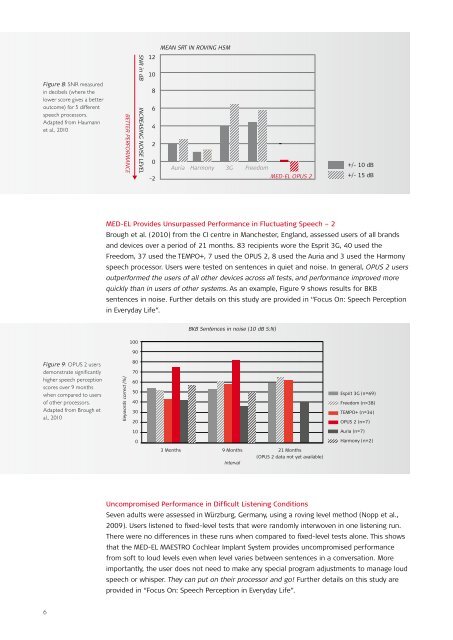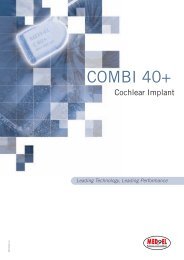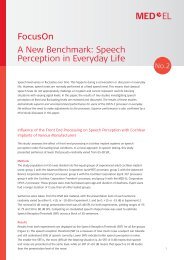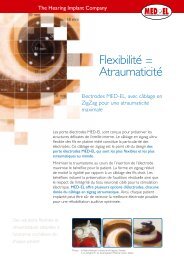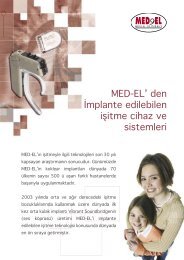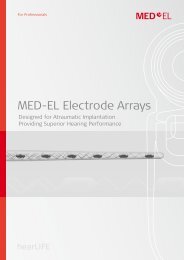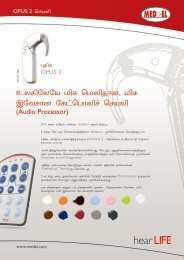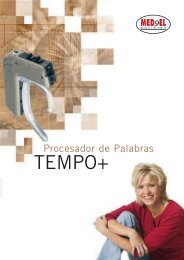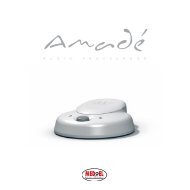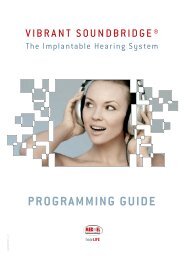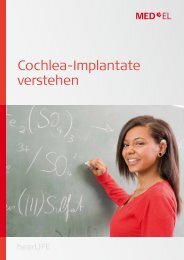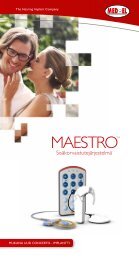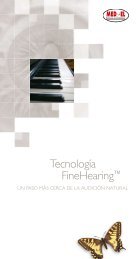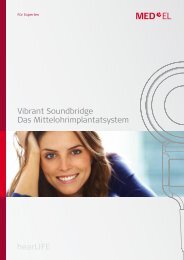MED-EL Cochlear Implant Systems Provide Best Benefit FocusOn
MED-EL Cochlear Implant Systems Provide Best Benefit FocusOn
MED-EL Cochlear Implant Systems Provide Best Benefit FocusOn
You also want an ePaper? Increase the reach of your titles
YUMPU automatically turns print PDFs into web optimized ePapers that Google loves.
Figure 8: SNR measured<br />
in decibels (where the<br />
lower score gives a better<br />
outcome) for 5 different<br />
speech processors.<br />
Adapted from Haumann<br />
et al., 2010<br />
Figure 9: OPUS 2 users<br />
demonstrate significantly<br />
higher speech perception<br />
(%)<br />
scores over 9 months<br />
when compared to users<br />
correct<br />
of other processors.<br />
Adapted from Brough et<br />
al., 2010 Keywords<br />
6<br />
BETTER PERFORMANCE<br />
SNR in dB<br />
INCREASING NOISE LEV<strong>EL</strong><br />
12<br />
10<br />
8<br />
6<br />
4<br />
2<br />
0<br />
-2<br />
MEAN SRT IN ROVING HSM<br />
Auria<br />
Harmony<br />
3G Freedom<br />
<strong>MED</strong>-<strong>EL</strong> OPUS 2<br />
+/- 10 dB<br />
+/- 15 dB<br />
<strong>MED</strong>‑<strong>EL</strong> <strong>Provide</strong>s Unsurpassed Performance in Fluctuating Speech – 2<br />
Brough et al. (2010) from the CI centre in Manchester, England, assessed users of all brands<br />
and devices over a period of 21 months. 83 recipients wore the Esprit 3G, 40 used the<br />
Freedom, 37 used the TEMPO+, 7 used the OPUS 2, 8 used the Auria and 3 used the Harmony<br />
speech processor. Users were tested on sentences in quiet and noise. In general, OPUS 2 users<br />
outperformed the users of all other devices across all tests, and performance improved more<br />
quickly than in users of other systems. As an example, Figure 9 shows results for BKB<br />
sentences in noise. Further details on this study are provided in “Focus On: Speech Perception<br />
in Everyday Life”.<br />
100<br />
90<br />
80<br />
70<br />
60<br />
50<br />
40<br />
30<br />
20<br />
10<br />
0<br />
3 Months<br />
BKB Sentences in noise (10 dB S:N)<br />
9 Months<br />
Interval<br />
21 Months<br />
(OPUS 2 data not yet available)<br />
Esprit 3G (n=69)<br />
Freedom (n=38)<br />
TEMPO+ (n=34)<br />
OPUS 2 (n=7)<br />
Auria (n=7)<br />
Harmony (n=2)<br />
Uncompromised Performance in Difficult Listening Conditions<br />
Seven adults were assessed in Würzburg, Germany, using a roving level method (Nopp et al.,<br />
2009). Users listened to fixed‑level tests that were randomly interwoven in one listening run.<br />
There were no differences in these runs when compared to fixed‑level tests alone. This shows<br />
that the <strong>MED</strong>‑<strong>EL</strong> MAESTRO <strong>Cochlear</strong> <strong>Implant</strong> System provides uncompromised performance<br />
from soft to loud levels even when level varies between sentences in a conversation. More<br />
importantly, the user does not need to make any special program adjustments to manage loud<br />
speech or whisper. They can put on their processor and go! Further details on this study are<br />
provided in “Focus On: Speech Perception in Everyday Life”.


